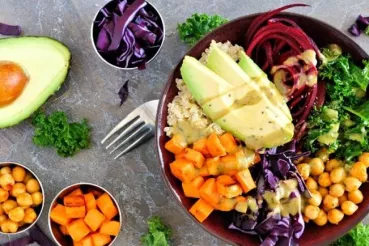A gluten-free diet: At least one Hollywood starlet attributes her good mental health to it, while others say it helped them shed unwanted pounds. An even larger, growing number of people credit it for easing their digestive troubles.
So it's not surprising that we see an abundance of gluten-free products on our grocery shelves, and gluten-free menus in our favorite restaurants and our children's schools.
But some experts say that, while extremely helpful to some people, a gluten-free diet doesn't possess the magical powers sometimes associated with it. So, why has avoiding gluten — a protein found in wheat, barley and rye — become so popular?
A way to manage celiac disease and gluten intolerance
"For people suffering from diagnosed celiac disease, which currently affects about 1 percent of Americans, a gluten-free diet isn't just a passing fad, it’s a necessity," says Sue Mikolaitis, RD, LD, CSND, a dietitian at Rush who specializes in gastrointestinal diseases and helps patients in Rush's Adult Celiac Disease Program.
When people with celiac disease eat foods containing gluten, it triggers an immune response in their small intestines. This response can wreak havoc on the inner linings of the small intestine and prevent the small intestines from absorbing needed nutrients.
Not only can this cause abdominal pain and diarrhea, but it can ultimately lead to vitamin deficiencies, and gluten can affect the brain, nervous system, bones and liver.
"By removing gluten from the diet in this population, you can't cure the disease, but you can manage it and prevent further damage to your body," Mikolaitis says.
There are also people who have "gluten intolerance" or "nonceliac gluten sensitivity," which is not associated with celiac disease. While symptoms may be similar to celiac disease, the mechanisms behind nonceliac gluten sensitivity are more of a mystery, and doctors have no definitive test for diagnosis. Rather, they must rely on first ruling out celiac disease and then noting an improvement of symptoms with a gluten-free diet.
If you have been diagnosed with either of these conditions, celiac disease or nonceliac gluten sensitivity, definitely give up the gluten, Mikolaitis says. While going gluten free can be tricky (gluten derivatives hide in places like canned fruit pie filling, imitation seafood and other processed foods), it's certainly not impossible, especially with the number of gluten-free products on the market today.
No symptoms, no worries?
But what about everyone else? Should we all live gluten free?
"Beyond these two groups — and those who suffer from a condition known as dermatitis herpetiformis, which is a chronic condition that causes itchy, bumpy skin — the benefits of living gluten free aren't significant," Mikolaitis says. "And there's certainly no evidence that it leads to weight loss or even a sharper brain, as some have noted."
While those with gastrointestinal disorders, like irritable bowel syndrome, don't do well with whole wheat products, it's not necessarily gluten causing the trouble, according to Mikolaitis.
Their problems, she says, often stem from an attempt to bulk up on fiber by consuming too much whole wheat when they should increase other fiber-rich foods instead, like fruits, vegetables, ground chia and flax seeds, and oat and rice bran.
"If you don’t have symptoms, like bloating or gas, don't give up the wheat or gluten," Mikolaitis says. "There are definitely nutritional downsides to going gluten free."
Gluten-free breads and pastas, for example, may not be fortified with important B-vitamins and iron, which play valuable roles in how the body gets and uses energy and oxygen. And many gluten-free alternatives — such as rice — may actually have more calories per serving. One-third of a cup of cooked rice, for example, has as many calories as one-half a cup of cooked pasta.
There's certainly no evidence that (a gluten-free diet) leads to weight loss or even a sharper brain, as some have noted.
Beyond gluten
The good news is that if you must live without gluten (and even if you don't), you do have choices, Mikolaitis says. Other naturally gluten-free products include amaranth and corn pastas, quinoa and millet cereals.
Just remember to take a USP-approved multivitamin to offset what you’re missing by not eating as many vitamin-enriched foods. The "USP" on the label signifies that the vitamins are free of contaminants and that the amounts of vitamins on the labels are accurate and are absorbable in the human body.
Another tip: Don't diagnose yourself if you suspect gluten is causing you problems. Talk to your doctor and work with him or her to determine next steps.




